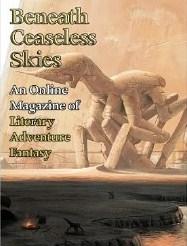 Beneath Ceaseless Skies #150, June 26 & July 3, 2014
Beneath Ceaseless Skies #150, June 26 & July 3, 2014
Reviewed by Michelle Ristuccia
“The Manor of Lost Time” by Richard Parks is told from the perspective of Sahel, powerful demon conjured by what is presumed to be a two-bit sorcerer. Sahel recounts his escape from a divine prison and the beginning of his partnership with Driana, a sorceress who has since passed into legend as “She Who Speaks in Fire.” While it is interesting that the story is told in second person, as Sahel speaks to the sorcerer who conjured him, the descriptions of The Manor of Lost Time, along with Driana’s story, fall short of memorable.
“The Inked Many” by Adam Callaway is one in a series of dark fantasy stories set in the city of Lacuna, where a plague turns its people to paper. In “The Inked Many,” Callaway uses a temporal causal loop to show readers the origin of the Inked Man, the living god of Lacuna. The story stands well on its own but reads even better alongside its companions, especially, “The Magic of Dark and Hollow” in Issue #96, which also features the Inked Man.
“The Black Waters of Lethe” by Oliver Buckram is a fantasy tale set in an afterlife along the shoreline of the river Lethe, taken from the Greek mythos as the river of forgetfulness. In Greek mythos, Lethe is one of the four rivers of Hades and borders Elysium, the final resting place of the virtuous. Readers already equipped with this knowledge may find this story more meaningful, as it is implied that the unnamed narrator may have died a virtuous death and be intended for Elysium, if only he can find a way off of the shore where he is marooned. The story’s end is inconclusive, focusing on the horrors of the narrator’s isolation in the physical world as well as the mental world of memory and knowledge.
In “The Unborn God” by Stephen Case, an orphaned boy apprentices to a wizard in a flying, domed house when priests of the unborn god threaten him and his father. The wizard is on a mission to stop the god’s takeover of both the present and the mutable past, before both are changed beyond repair. A seemingly insurmountable problem leads to a satisfying epiphany of a conclusion. High fantasy with science fiction themes, “The Unborn God” brings the reader a sense of wonder found in the best of speculative fiction.
Michelle Ristuccia enjoys slowing down time in the middle of the night to read and review speculative fiction, because sleeping offspring are the best inspiration and motivation. You can find out more about her other writing projects and geeky obsessions by visiting her blog.